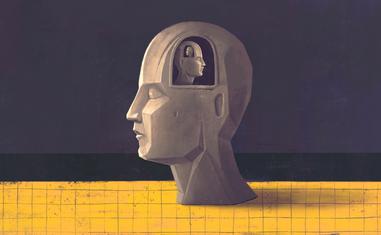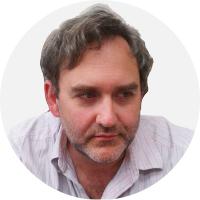The views expressed in our content reflect individual perspectives and do not represent the authoritative views of the Baha'i Faith.
Marxists like Lenin held the 19th century physicist Ludwig Boltzmann, called a “hero of scientific materialism,” in high regard for what they saw as his support of materialistic philosophies.
Often described as a “materialist” philosopher due to his atomistic views, rejection of human idealism and his wholehearted acceptance of evolution, Boltzmann pioneered a scientific field called statistical mechanics, which explains and predicts how the properties of atoms determine the physical realities of nature itself.
Thus, it might seem strange at first to notice some striking commonalities between the views of Boltzmann and his contemporary, Abdu’l-Baha, the son of Baha’u’llah, the prophet and founder of the Baha’i Faith.
Both men, incidentally, were born in 1844 – which saw the declaration of the Bab, marking the birth of the Baha’i Faith. Abdu’l-Baha was born on the very night of the Bab’s declaration – May 23, 1844 – and Boltzmann a few months earlier in February.
RELATED: The Enlightenment, Materialism, and the Loss of Meaning
Also, both seemed to believe in the concept of atoms. For example, Abdu’l-Baha in many of his philosophical discussions – like this one in the book Some Answered Questions – referred to the existence of atoms in the original sense of that word as a fundamental indivisible particle:
Nature is that condition or reality which outwardly is the source of the life and death, or, in other words, of the composition and decomposition, of all things.
This nature is subjected to a sound organization, to inviolable laws, to a perfect order and to a consummate design, from which it never departs. To such an extent is this true that were you to gaze with the eye of insight and discernment, you would observe that all things – from the smallest invisible atom to the largest globes in the world of existence, such as the sun or the other great stars and luminous bodies – are most perfectly organized, be it with regard to their order, their composition, their outward form, or their motion, and that all are subject to one universal law from which they never depart.
But beyond these superficial similarities, their philosophies have more in common than initially apparent. By the end of the 19th century, a majority of philosophers and many physicists were not convinced of the existence of atoms, and many believed in the Energetics concept, which was championed by the famous philosopher and physicist Ernst Mach and the physical chemist Wilhelm Ostwald.
The Energetics concept presumed that energy, not matter, made up the chief component of the universe. Against this trend, Boltzmann developed a new theory of thermodynamics based on the kinetic motion of atoms and molecules. He showed that the classical understanding of thermodynamics could be re-derived by considering the probabilistic behavior of a many-particle system – an approach called statistical mechanics.
During his lifetime Boltzmann struggled against philosophers and physicists who rejected the existence of atoms. These were mostly idealists of his age who had embraced the dogma of Energetics, supported by many intelligent and respected individuals. The concept of Energetics had even gone so far as to equate the physical idea of energy with the ill-defined concept of “mental energy.” After Wilhelm Ostwald, half joking, made an algebraic formula for happiness, Boltzmann railed against them and this construction of “theoretical structures out of mere words and phrases”.
Such was Boltzmann’s frustration with the philosophers of his age that he expressed antagonism to whole project of philosophy quoting Francis Bacon and calling it a “a hallowed virgin. … that she will remain eternally barren precisely because of this lofty quality.” Yet he still saw value in philosophy and in an attempt to rescue it and to defend his ideas against the bitter attacks of his famous colleague, Ernst Mach, Boltzmann went on to become a philosopher.
If we probe Boltzmann’s philosophy a bit, it is evident that there is much more nuance to his so-called materialism. An inkling of this can be seen in the forward to Part 1 of his Lecture on Gas Theory, where he quotes the German poet Goethe “Alles Vergängliche Ist nur ein Gleichnis!” or, “all transitory things are only symbols or reflections (of reality).” His version of materialism did not entail the rejection of a deity, but rather the claim that an external material world does exist and is knowable by science. He did not reject the transcendent, but acknowledged that what is possible to know resides in the realm of science and that this knowledge has its limits:
It is certainly true that only a madman will deny God’s existence, but it is equally the case that all our ideas of God are mere inadequate anthropomorphisms, so that what we thus imagine as God does not exist in the way we imagine it. If therefore one person says that he is convinced that God exists and another that he does not believe in God, in so saying both may well think the same thoughts without even suspecting it. We must not ask whether God exists unless we can imagine something definite in saying so; rather we must ask by what ideas we can come closer to the highest concept which encompasses everything. – Ludwig Boltzmann: The Man Who Trusted Atoms.
RELATED: Life, Matter and the God Particle
Thus, in both accepting the reality of a deity yet rejecting the possibility of conceptualizing it, Boltzmann appears to line up with the nature of Divinity Abdu’l-Baha described in Some Answered Questions:
Know that the reality of the Divinity and the nature of the divine Essence is ineffable sanctity and absolute holiness; that is, it is exalted above and sanctified beyond every praise. All the attributes ascribed to the highest degrees of existence are, with regard to this station, mere imagination.
In the next article we will explore Boltzmann’s interesting ideas of “Theoretical Pluralism” and “Realism” and examine the fascinating parallels those ideas have with the writings of Abdu’l-Baha.

















Comments
Sign in or create an account
Continue with Facebookor